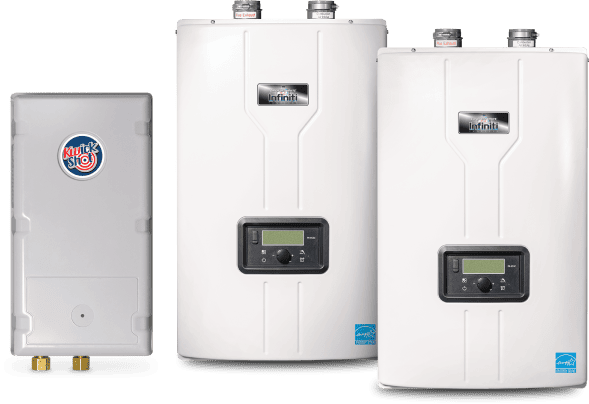How Tankless Water Heaters Elevate Household Benefits
How Tankless Water Heaters Elevate Household Benefits
Blog Article
Any individual is bound to have their own theory in relation to Unveiling the Hot Trend: The Benefits of Tankless Water.

In a globe where comfort and performance reign supreme, it's no surprise that home owners are continuously in search of smarter means to handle their home's energy intake and convenience. One technology that has steadily obtained popularity is the tankless water heater. However exactly what makes these systems attract attention from the traditional tank-based designs the majority of us grew up with? Let's dive in and check out the advantages of tankless water heaters, helping you decide if it's time to make the switch in your home.
Introduction
Photo this: you step into the shower after a long day, expecting a relaxing waterfall of warm water, only to be greeted by icy beads since the last individual used all of it up. Noise familiar? Traditional water heaters keep a set amount of hot water, implying you go to the mercy of that container's supply. Tankless systems, on the other hand, warm water as needed. No more going out mid-shower, say goodbye to wrestling with schedules simply to ensure warm water is available.
Comprehending Tankless Hot Water Heater
What Are Tankless Hot Water Heater?
Tankless water heaters, sometimes called on-demand or instant hot water heater, give hot water only as it's needed. As opposed to saving gallons of pre-heated water, these units kick right into activity the minute you switch on the faucet. Water goes through a heat exchanger, heating up in real-time, indicating you get a nonstop circulation of warm water without the requirement for a huge tank resting idly by.
How Do They Differ from Traditional Equipments?
Standard heating units hold a reservoir of warm water, using power to keep that storage tank at a consistent temperature. Tankless systems get rid of the standing supply, reducing lost power and the cumbersome impact of a large cylinder. Basically, you're updating from a "stockpile" frame of mind to a "made-to-order" method.
Common Sorts Of Tankless Systems
Tankless water heaters generally come in two varieties: gas and electric. Gas models have a tendency to provide greater circulation prices, perfect for larger households, while electric models commonly serve smaller homes and are usually much easier to mount. In addition, some systems are made for point-of-use (offering one component) while others can manage the whole home's warm water requirements.
Secret Advantages of Tankless Hot Water Heater
Power Efficiency and Cost Savings
Say goodbye to heating up a titan tank's worth of water and keeping it warm all day. Tankless heating units decrease standby power losses, which can reduce energy bills. While the first cost might be greater, the long-term financial savings usually justify the financial investment.
3. Space-Saving Style
If your home is short on storage, getting rid of the large container maximizes useful area. Tankless units are portable and can commonly be placed on wall surfaces, concealed in corners, or installed in limited utility storage rooms without having all to oneself the entire area.
4. Longer Lifespan
A well-maintained tankless water heater can outlast its tank-based relative. Conventional containers might last 10-15 years, while tankless models can maintain downing along for two decades or even more, making them a solid investment with time.
1. Unlimited Hot Water Supply
Ever needed to arrange showers so every person obtains their reasonable share of hot water? With tankless, that comes to be a distant memory. As long as the heating unit's flow ability isn't gone beyond, you can take back-to-back showers without developing into a popsicle.
5. Improved Water Quality
Storing water in a container can often lead to debris build-up or a slightly "off" preference. With tankless systems, fresh water is warmed right away, minimizing the chances of debris accumulation and potentially offering cleaner-tasting water.
Considerations Before Switching
Though the benefits are engaging, it's wise to take into consideration a few variables prior to fully devoting.
Assessing Your Home's Water Use Patterns
If your family all at once utilizes numerous components with high warm water demand, ensure the device's circulation price fulfills your needs. Knowing your use patterns aids you choose the right dimension and kind of tankless heating unit.
Maintenance and Treatment Tips
Tankless systems are relatively reduced maintenance, however they aren't set-it-and-forget-it appliances.
Normal Cleansing and Descaling
Hard water minerals can build up in the heat exchanger, impacting effectiveness. Regular descaling (usually suggested yearly) maintains the system performing at peak performance.
Annual Professional Inspections
A yearly checkup from an expert makes sure small issues are caught early. They'll analyze the device's performance, search for leakages, and assist preserve optimal effectiveness.
Initial Investment Prices
Tankless heating units usually include a greater in advance price. Between the device itself and potential setup adjustments, the first cost could offer you sticker label shock. However remember to watch it as a lasting financial investment.
Installation Demands
Depending upon your home's facilities, you may require added electric ability or gas line upgrades. Guarantee you understand the installment requirements and talk to a professional to avoid surprises.
Ensuring Correct Ventilation
For gas versions, appropriate ventilation is vital to safely expel exhaust gases. Make certain venting systems are clean and properly installed to avoid any type of prospective safety and security hazards.
Comparing Different Brands and Versions
Not all tankless water heaters are produced equal.
Researching Reliable Makers
Search for respectable brands with a background of producing high quality systems. A reliable producer frequently gives much better consumer assistance and longer service warranties.
Setup: Do It Yourself or Expert?
While some home owners delight in dealing with tasks themselves, tankless setup might not be the best time to break out the tool kit.
Pros and Cons of Do It Yourself Installation
A do it yourself mount could conserve money, yet it features dangers. Wrong installment can result in inefficiency or safety concerns. If you're handy and have experience, it might be feasible-- but wage caution.
Checking Out Evaluations and User Feedback
Individual evaluations and responses from neighbors or close friends who have actually gone tankless can supply valuable insights. Occasionally, real-life experiences can be a lot more telling than advertising and marketing pamphlets.
When to Call a Specialist Plumber
For a lot of, calling a pro makes certain every little thing's done properly. A specialist plumbing comprehends neighborhood codes, sizing needs, and venting parameters, decreasing the threat of incidents.
Making best use of Performance
You have actually invested in a tankless system-- now maximize its effectiveness.
Optimum Temperature Level Setups
Most people establish their devices in between 120-140 F. Adjusting the temperature level can improve comfort and cost savings. Experiment to locate a pleasant area that doesn't lose energy.
Coupling With Low-Flow Fixtures
Want to stretch your system's capabilities? Think about setting up low-flow showerheads and faucets. They minimize water use, enabling your tankless system to supply a stable stream of warm water without straining.
Ecological Impact
Tankless hot water heater align with greener living objectives.
Minimized Carbon Impact
By using much less power and only home heating water as required, tankless systems can lower your home's carbon footprint, decreasing your environmental effect.
Saving Natural Resources
Less energy intake and much less lost warm water translate into fewer natural resources being used, an environmental win-win.
Who Profits A Lot Of from Tankless Heating systems?
The beauty of tankless heating systems is that they can fit a selection of families.
Large Family Members vs. Single Residents
Huge families may enjoy the unlimited warm water supply, while solitary residents appreciate the power savings from not warming an entire container for just a single person's early morning shower.
Property Owners with Limited Space
If your home is short on square video, shedding the cumbersome tank frees up space for other fundamentals-- or possibly simply a lot more breathing space.
Eco-Conscious Consumers
Going tankless aligns with eco-friendly worths, guaranteeing you're not losing energy or resources.
Future Fads in Tankless Water Heaters
The globe of home devices is ever-evolving, and tankless hot water heater are no exception.
Advancements in Innovation
R&D is continuously boosting warm exchangers, making devices much more effective and sturdy. Future designs could be even quieter, extra small, and far better suited for differing environments.
Smart Home Integration
Imagine readjusting your water heater's temperature level via an application or obtaining maintenance informs on your phone. As wise home technology breakthroughs, we'll see more connectivity and convenience.
Final thought
Choosing a tankless water heater is greater than just updating your home's warm water system; it's purchasing long-lasting comfort, power effectiveness, and a greener way of life. By considering your family's water usage, bearing in mind installation demands, and committing to routine upkeep, you can take pleasure in a stable stream of hot water without the baggage of a bulky tank. As modern technology advances, you can look forward to also smarter, a lot more reliable tankless options that not just make your life simpler however additionally benefit the earth.
Why You Should Consider a Tankless Water Heater for Your Home
Energy Efficiency and Cost Savings
Tankless water heaters, also known as on-demand water heaters, heat water only when needed. This means they don't waste energy keeping a tank of water hot constantly. This efficiency translates into substantial cost savings on your monthly energy bills.
Endless Hot Water Supply
One of the significant advantages of tankless water heaters is their ability to provide a continuous supply of hot water. Traditional tank water heaters have a limited capacity and can run out of hot water, especially during peak usage times. In contrast, tankless water heaters can provide an endless stream of hot water, making them ideal for larger families or homes with high water usage.
Space-Saving Design
Tankless water heaters are compact and take up significantly less space compared to traditional tank heaters. They can be installed on walls, under cabinets, or even outside, freeing up valuable space in your home. This makes tankless water heaters a great option for smaller homes or properties with limited space for a traditional water heater.
Longer Lifespan and Lower Maintenance
Tankless water heaters typically have a longer lifespan compared to traditional tank heaters. They can last up to 20 years or more with proper maintenance. Additionally, tankless systems are designed with replaceable parts, which can extend their lifespan further and reduce long-term maintenance costs.
Environmentally Friendly
Reducing energy consumption not only saves you money but also benefits the environment. Tankless water heaters contribute to a smaller carbon footprint by using less energy to heat water. Their energy efficiency and ability to minimize standby heat loss make them an eco-friendly choice for environmentally conscious homeowners.
Customized Temperature Control
Tankless water heaters offer precise temperature control, allowing you to set the desired temperature to meet your specific needs. This level of customization ensures you always have water at the perfect temperature for your comfort and usage requirements.
https://beantownservices.com/blog/consider-tankless-water-heater-for-your-home

As a devoted person who reads on Unveiling the Hot Trend: The Benefits of Tankless Water, I figured sharing that section was really helpful. In case you enjoyed reading our post plz do not forget to pass it around. Thank you so much for going through it.
Schedule Now Report this page